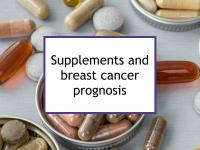While most studies have found no association between multivitamin use and breast cancer risk, multivitamin use has been reported to be associated with slightly lower likelihood of recurrence in several studies of breast cancer survivors. Now a major Danish study has confirmed this result and also reported findings concerning several other supplements, including vitamin A, vitamin B12, vitamin D, iron and magnesium.
Some compounds used as supplements by breast cancer patients and survivors have been shown to have a U-shaped dose-response curve in cell or animal studies. In other words, a deficiency in the compound appears to promote breast cancer, but so does a relatively high dose. However, the sweet spot of maximum benefit at the bottom of the curve has not been established for most supplements.
Vitamin D supplements
Unlike most popular micronutrients, vitamin D has been studied very extensively. The current study reports that both low and high levels of vitamin D are associated with lower life expectancy after a diagnosis of breast cancer.
The blood test for vitamin D measures the level of 25-hydroxyvitamin D (25(OH)D), which is the primary metabolic product of vitamin D3 found in the blood. Vitamin D deficiency is typically defined as less than either 20 or 25 nmol/L 25(OH)D. However, the optimal 25(OH)D level for preventing breast cancer recurrence appears to be at least 40 ng/mL. Based on evidence to date, 40 to 50 ng/mL may be an appropriate target range, although some practitioners argue for higher levels. Please see our article concerning vitamin D.
In any case, when a beneficial compound is administered at low doses by consuming food, it is likely to have subtle chemopreventive effects, whereas the same compound administered at high doses is more likely to have pharmacological effects, with possible unwanted outcomes.
Latest research links several supplements to poorer life expectancy
The large prospective study referenced above was designed to investigate the association between supplement use and life expectancy after breast cancer. To conduct the study, the authors used data from the Danish Diet, Cancer and Health cohort. The study included 1,951 breast cancer cases who were followed for up to 20 years from diagnosis until death, migration, or end of follow-up. The median follow-up period was 12 years. Pre-diagnostic and post-diagnostic supplement use were assessed using a validated food frequency questionnaire. Pre-diagnostic use was set as the main exposure. Differences in 20-year life expectancy and years lost due to breast cancer and other causes were estimated while adjusting for potential confounders. A total of 725 study participants died during follow-up; 450 of the deaths were breast cancer-specific.
Supplement use overall was not found to be linked to breast cancer mortality. Multivitamin use was associated with longer life after breast cancer diagnosis (1.01 years), which was due primarily to less time lost to breast cancer. Additional analyses linked high intakes of supplementary vitamin A, vitamin B12, iron, and magnesium to reduced life expectancy. Both low and high intake of vitamin D were found to be associated with lower life expectancy. Further analyses indicated that antioxidant supplements may be associated with poorer life expectancy among chemotherapy recipients, but not among those receiving radiotherapy.
The authors conclude that women with breast cancer may benefit from multivitamin use. However, generally speaking, they should avoid excessive use of supplements, avoiding exceeding recommended levels. This is especially true of antioxidant supplements during chemotherapy and high intakes of certain micronutrients.
Please see our articles on multivitamins andvitamin D for more information.
